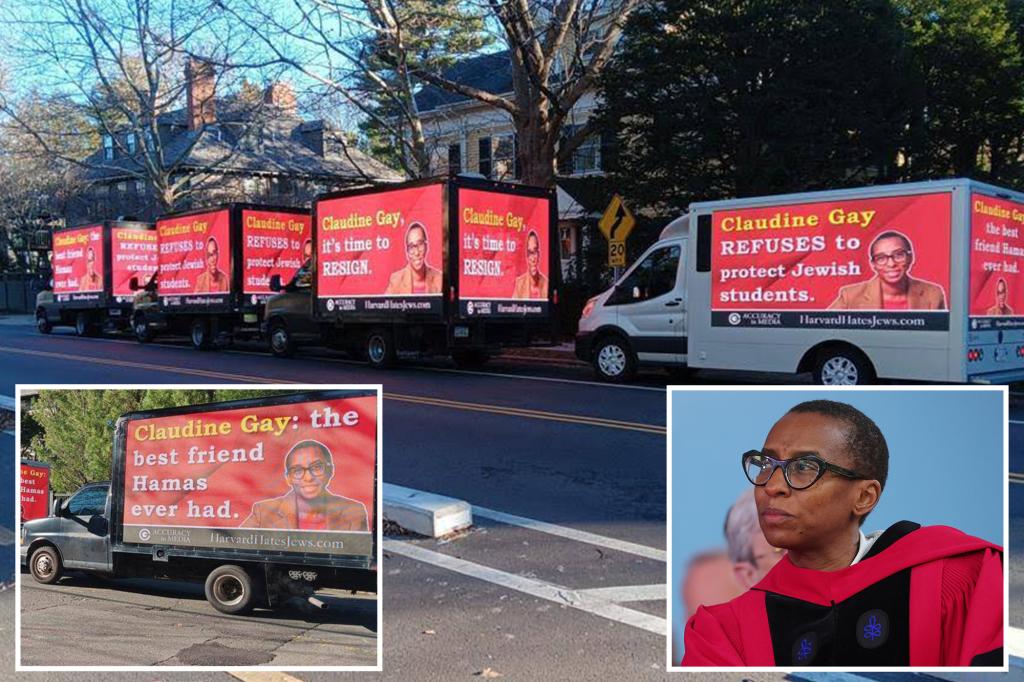In the small town of Cambridge, Massachusetts, home to the venerable Ivy League institution Harvard University, an unusual spectacle can be seen. The usually quiet academic air is disrupted by a fleet of four box trucks, each bearing a mobile billboard. The larger-than-life images flash a repeated message, “Claudine Gay: the best friend Hamas ever had,” casting an accusatory spotlight on Harvard President Claudine Gay. This display is orchestrated by Accuracy in Media, a non-profit news watchdog agency, known for its recent exposure of Harvard students involved in pro-Hamas activities.
NEW: The 'Harvard Doxxing Truck' has multiplied and has found its next target: Harvard president Claudine Gay.
The fleet, which now consists of at least four trucks, is driving around, displaying a photo of the Harvard president with text that reads: "Claudine Gay: the best… pic.twitter.com/BHikgYXCaY
— Collin Rugg (@CollinRugg) December 13, 2023
The digital billboards cycle through a suite of messages, each one a searing indictment of Gay’s perceived actions or inaction against on-campus anti-Semitism. One billboard calls for her resignation, while another accuses her of refusing to protect Jewish students. These high-tech protest signs, positioned in plain sight of Gay’s residence, serve as an indelible reminder of the questions surrounding her leadership.
What led to this unusual series of events? Last month, a group of Harvard students endorsed a pro-Hamas letter following the October 7 terror attacks in Israel, spurring widespread outrage. Accuracy in Media catapulted into the public eye with their detailed exposure of these students, highlighting their affiliations with the letter. The trucks are yet another tool deployed by the watchdog in their continued efforts to combat what they see as a grave failure on the part of the Harvard administration.
The man at the helm of Accuracy in Media, President Adam Guillette, emphasizes the importance of maintaining pressure. Universities, he notes, rarely hold their presidents accountable. “I think [Gay] needs to, one, put a greater focus on protecting Jewish and pro-Israel students on campus and, two, stand up to terrorist sympathizers on campus.”
The trucks, apart from displaying various messages, also advertise the website HarvardHatesJews.com. The website is an active forum where individuals are encouraged to send emails to the Harvard board of trustees, voicing concerns over on-campus antisemitism. The site provides a pre-written message that can be sent to the board and other high-ranking staffers, urging them to expel the offending students.
Positive response to this initiative has been overwhelming, claims Guillette. Over 5,000 people have sent emails on more than one occasion in a week. The idea of using a billboard truck may come off as unconventional, but it seems to be garnering desired attention and results.
However, despite the website’s activity and public outcry, Harvard has stood by President Gay, who continues to be embroiled in controversy in the wake of a congressional testimony last week. Her responses to questions about antisemitism on campus, in which she suggested that calling for the genocide of Jews might not necessarily violate Harvard’s codes of conduct, depending on “context,” have drawn widespread criticism and allegedly led to Harvard losing $1 billion in donations.
While the trucks, the website, and public sentiment continue to direct scrutiny towards Claudine Gay, questions also arise over her academic integrity. Accusations that she plagiarized numerous sections of the Ph.D. thesis she wrote while at Harvard have surfaced. As yet unanswered, these accusations add another layer of complexity to the embattled president’s standing within her alma mater and her stewardship of it.
The current drama at Harvard offers a clear demonstration of the ripples created by perceived failures of leadership. At the heart of this controversy is the question of how higher education institutions should respond to anti-Semitism and hate speech on their campuses.
As the billboard trucks continue their vigil outside President Claudine Gay’s residence, it is a stark reminder that the actions of academic institutions and their leadership during testing times will be held to account, if not by them, then by the public they serve.
In conclusion, the unrelenting visual protest by Accuracy in Media underscores the ever-urgent need for institutional accountability, especially in increasingly polarized times. The debate around President Gay’s alleged failings draws attention to a broader question of ethics and responsibility in academia. Despite the Harvard Corporation’s support of Gay in light of recent allegations, it is clear that the battle for accountability is not yet over. The trucks, the billboards, the website, and the angst of the community they represent continue to challenge the actions of this prestigious institution’s leadership asserting an insistent call for answerability.




